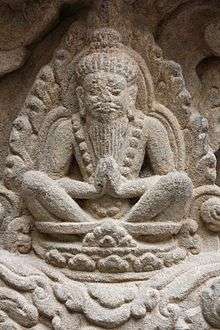Mudgala
Rishi Mudgal, also known as Rajarshi Mudgal (or written as Mudgala), is one of the Rajarshi in Hinduism. He was originally born as a Kshatriya king but later on due to severe meditation, or Yoga, he received Brahmatva (Nirvana), due to which his descendants were later on known as Brahmins. He is the only Rishi with his name over a purana named Mudgala Purana.[1]
| Mudgala | |
|---|---|
 Rishi Mudgala | |
| Devanagari | मुद्गल |
| Affiliation | Hinduism |
| Adherents | Vaishnavism |
| Texts | Mudgala Upanishad, Mudgala Purana, and Ganesh Purana |
| Gender | Male |
| Personal information | |
| Parents | Bhamyarsva (father) |
| Consort | Nalayani Indrasena |
| Children | Maudgalya (who became Brahmin), Vadhryasva (who became King), Divodasa, Ahalya |
| Dynasty | Panchala |
Rishi Mudgal wrote 1 Upnishad out of 108 Upnishads named Mudgal Upanishad. Mudgal Upanishad is of a very special type and unique amongst all upanishads ever written. It is the foundation of Vaishnavism, asserting that Vishnu is the Purusha, or primordial person.[2] The great sage strongly believed in simple living high thinking and had a high-level patience amongst other Rishis. That's why still today the persons belonged to Mudgal Gotra are considered highly ethical and had infinite patience in compare to average.
History
Rishi Mudgal was the son of a Chandravanshi /Nagavanshi Kshatriya King Bhamyarswa of Panchal Rajya, at present the Punjab State of India. He is considered as one of the Rajarshi in Hinduism next to Vishvamitra. Mudgal lived in a forest and ruled over his kingdom as well as he taught as a Kulguru in a Gurukula.
According to Bhagavad Gita, Mudgal had 50 sons out of which Maudgalya was the eldest one. Maudgalya's son were rewarded as Rajpurohitas. Among his sons, he appointed Maudgalya to become the priest and continue his path towards gods while made his other son
Rishi Mudgal was married to Nalayani, daughter of Nala Nishada king. Maudgalya, Vadhryasva, Divodas, and Ahalya were their children. Nalayani served Mudgal with whole heart even when Mudgal was suffering from leprosy. Happy with her service Mudgal offered a boon to Nalayani. Nalayani wanted to consummate their bond properly and Mudgal granted her wish in five forms. When Rishi Mudgal attained moksha, he left the mortal life but Nalayani in her next birth, when she could not find a matching suitor, did penance for Lord Shiva. When Lord Shiva appeared to give her boon she asked for a husband five times in her eagerness so Shiva granted her the boon for five husbands with some exceptions. That is the secret for the birth of Draupadi in Mahabharata and being married to Pandavas who were incarnations of Yama, Vayu, Indra and Ashwini devathas who came to earth for restoring peace to Earth.
A seal from Sumer, (of Mudgala, [3] Lord of Edin, Minister to Uruas [4]) shows the word Azu, which meant water-divinator (lit. water knower), and additionally, physician.[3] Lord Mudgala was the son of Uruas the Khad,[5] who was the first dynasty of Sumeria (via Phoenicia) of the fourth millennium BCE.[6]
Genealogy
Mudgala was a descendant of Ajamidha's dynasty, forming the most prominent Northern Panchala dynasty of Mahabharata. His genealogy from Ajamidha goes on as follows:
|
|
|
This lineage came up to Drupada, a Mahabharata war character who fought from the side of the Pandavas.
Mentions in Bhagavata Purana
Rishi Mudgala is also mentioned in Bhagavat Purana. The verse goes:
The son of Śānti was Suśānti, the son of Suśānti was Puruja, and the son of Puruja was Arka. From Arka came Bharmyāśva, and from Bharmyāśva came five sons — Mudgala, Yavīnara, Bṛhadviśva, Kāmpilla and Sañjaya. Bharmyāśva prayed to his sons, “O my sons, please take charge of my five states, for you are quite competent to do so.” Thus his five sons were known as the Pañcālas. From Mudgala came a dynasty of brāhmaṇas known as Maudgalya. (S.B. 9.21.31-33)[8]
It is from these Panchalas that the Panchayat System, one of the oldest practiced political system, was introduced in India and Nepal.
Gotras
Mudgala's eldest son Maudgalya's name was used to make one of the Brahmin Gotra, Maudgalya. People having lineage to Mudgala mainly have these gotras:
- Mudgala
- Maudgalya (Moudgalya)
See Also
References
- Upreti Vanshavali. Kathmandu: Upreti Samaj Sewa Samiti, 1995. 2009.
- "Mudgala Upanishad", Wikipedia, 2019-05-25, retrieved 2020-02-02
- L.A. Waddell CB, CIE, F.L.S., L.L.D, M.Ch., I.M.S. RAI, F.R.A.S (2013). The Indo-Sumerian Seals Deciphered - Discovering Sumerians of Indus Valley as Phoenicians, Barats, Goths & Famous Vedic Aryans 3100-2300 B.C. Read Books Ltd. p. 107. ISBN 1473391288. Retrieved 2015-12-27.CS1 maint: multiple names: authors list (link)
- C. Preston (University of Swansea) (2009). The Rise of Man in the Gardens of Sumeria: A Biography of L.A. Waddell. Sussex Academic Press. ISBN 1845193156. Retrieved 2015-12-27.
- L. A. Waddell (2013-04-16). The Indo-Sumerian Seals Deciphered - Discovering Sumerians of Indus Valley as Phoenicians, Barats, Goths & Famous Vedic Aryans 3100-2300 B.C. Read Books Ltd. ISBN 1473391288. Retrieved 2015-12-27.
- L. Waddell (2013). The Aryan Origin of the Alphabet - Disclosing the Sumero-Phoenician Parentage of our Letters Ancient and Modern. Read Books Ltd. ISBN 1447481739.
- "Panchala Kingdom (Mahabharata)", Wikipedia, 2020-01-18, retrieved 2020-02-02
- "ŚB 9.21.31-33". vedabase.io. Retrieved 2020-06-30.
.
.jpg)